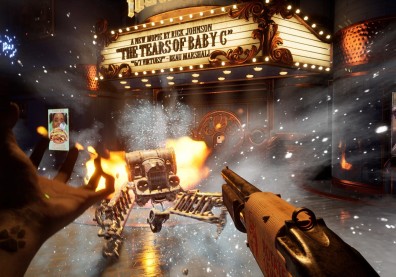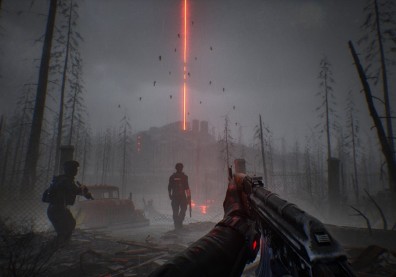When it comes to the "Bioshock" series from Irrational Games, the first thing anybody points to is the story and the world - not necessarily the gameplay. It played well, the plasmids were a great combat mechanic, but the ideas of indoctrination and the perfect society set within the grand, disemboweled dystopian city of "Rapture," were the framework for creating one of the most engaging games of that year.
You could say the same for all of video gaming history. Bioshock was a success, not because of its characters, but because of its setting and the emerging confrontations that came about within it. The upcoming "Bioshock Infinite" seeks to replicate that success with a new story and a new setting, but based on the same principles of storytelling - build that intriguing, controversial world, and you could throw anybody into it, nameless and faceless or otherwise under the constraints of any kind of narrative, and your game might just give players a brand new kind of experience. They just happen to be giving the main character a name this time.
Columbia is a floating city, literally "above" everything else, built on the ideals of American Exceptionalism. America, because of its unique revolutionary history, is above any kind of natural or manmade rule. The inhabitants and warring factions within the city idolize various American Political figures, and in some ways Columbia's unraveling mirrors Rapture's downfall, only it's happening now, as protagonist Booker DeWitt begins his journey.
But DeWitt himself is a cliché. He's a gambler with a debt problem, so he takes on a risky job to pay it back - save the girl, Elizabeth, who has mystical powers. That last sentence should sound as ho hum as possible, but within the context of "Bioshock Infinite's" world, it's bound to be a knockout, because it's not DeWitt or Elizabeth you're looking to for engagement, it's everything around them. That's how a video game works, it gives players a place to explore. And then, magically, those characters placed inside are more compelling for it. As a bonus, the story of American Exceptionalism is told, the ideas and the flaws of those ideas imparted onto the players and the end goal of the story is achieved. In the end, it has nothing to do with characterization. DeWitt and Elizabeth aren't the story, Columbia is. You've heard it said before - Liberty City is the main character in "Grand Theft Auto" or it was the atmosphere in "Dead Space" that made the game. They said it about Rapture and they'll say it again about Columbia.
This is how a video game story needs to be made. The settings, the inherent flaws and conflicts within them, aren't just characters, they are the story. The avatars we jump into are just vehicles. It works this way because, like a movie asks the audience to explore a character, a video game asks the player to explore a level, or a mission or a world, all within a well-crafted setting. And then, gleefully, you can put whatever kind of gameplay you want in there. You just can't do that when you've created specific characters, because after they go off killing a hundred people in twenty seconds, trying to convince players their avatar is the same character who's going to show up in the next cut scene is impossible. The "Tomb Raider" reboot tried to do this, and Lara Croft was certainly interesting, but the believability of her emotional frailty quickly fell victim to the endless slaughter of her enemies. Mixing gameplay and character is nearly impossible in this way. But it is possible when the setting is the story, the character, not the people within it. That's the trick that "Bioshock" managed to pull off.
And yet, despite "Bioshock's" success, we still have plenty of games that try to tell the Hollywood story of the hero winning the day without putting them in any real context. The games suffer for it. Look at "Gears of War 3." Marcus has daddy issues, finds his daddy, resolves issues and creates world peace in the process. I'm pretty sure the world is called Sera, but if you asked me to detail anything else about it, other than the fact that humans and giant bug-humans were at war on it, I'd need to jump straight to Wikipedia. It was dull and boring, and Epic's attempt at creating blockbuster "heroes" completely failed. "Call of Duty" makes the same exact mistake. But it's not their fault, it's the medium's fault (and, really, it's their fault for not recognizing this) - video games simply aren't meant to tell linear tales. They're meant to build entire universes, engaging universes, for the sake of dropping a narrative into it. Let me be clear, there is a vast different between narrative and story, and it's the successful story we're trying to achieve. A narrative is just one way to get at it. I'm saying that, for video games, the setting is a far more successful, even logical route. These settings can be as small as Isaac's basement in "The Binding of Isaac," or it can literally be an entire universe, which brings me to "Mass Effect."
"Mass Effect" is like throwing a hundred different Raptures and Columbias into one game, only those places are represented by characters instead of actual visualizations of the planets from which they originate. It's an odd setup, and obviously a very successful one, but it strengthens the idea that the setting reigns superior over characters:
Shepherd is not a character, he or she is an ambitious attempt to fully convince the player he or she is actually in the "Mass Effect" universe. BioWare's writers attempted to account for as many different versions of the character as possible so he could "Shepherd" you into the universe, and subsequently, into the world. The name for the character is not a coincidence, and my theory is they named him for that purpose and then made a shepherd within the context of the narrative afterwards. The point is, when Shepherd feels like an extension of yourself, you can believe in the universe you're in, and then the story becomes a success. That story isn't a combination of teammates Talia or Jack, Thane or Mordin, but an amalgamation of their races and the conflicts that evolved from their differences and the alliances that came about from their common enemy. Creating this team of heroes wasn't the tale that was told, meshing these different societies and seeing what happened was. Shepherd was your avatar, his teammates were representations.
Now, I ask you to look at "Journey" and "Limbo" and tell me those aren't some of the best stories video games have ever told. They just happen to feature nameless, speechless characters that exist for the sole reason of exploring the setting laid out to them.
Sure, you could point to a game like "The Walking Dead" as a glaring exception to the theory (it's arguable whether that's really a video game at all). In reality, the question of how video games can tell stories is being answered in many ways and at varying degrees of success, but the answer to how video games can evolve the way we tell stories may just be "Bioshock's" greatest contribution to the medium. It's not the people, it's the world in which they're thrown in which creates the tale, and while plenty of films strive to do this, video games are uniquely suited towards approaching stories in this way. A film cannot be explored, a video game can.









